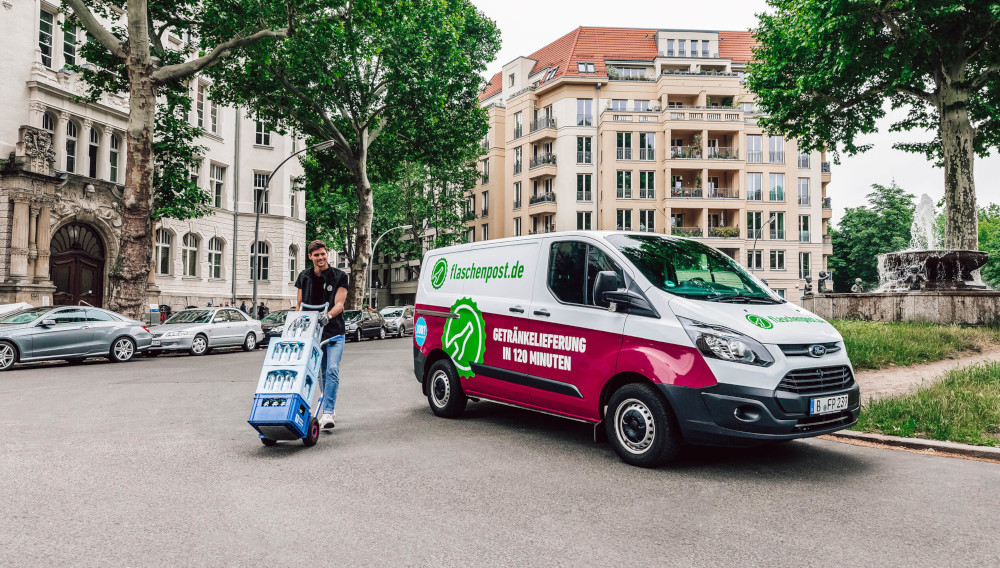Dr Oetker takes over delivery firm flaschenpost for EUR 1 billion
Germany | The drinks delivery start-up flaschenpost (a pun on “message in a bottle”) was sold to the Oetker Group, a food and beverage conglomerate, for allegedly EUR 1 billion (USD 1.2 billion). The spectacularly expensive deal makes observers question the rationale behind it.
flaschenpost is a Münster-based start-up, which was founded in 2016 to serve the heavily populated federal state of North-Rhine Westphalia, home to 18 million people. It has since expanded to 23 German cities with its own depots and 1,300 delivery vans. What distinguishes flaschenpost from other delivery services is its speed of delivery. Orders can be placed via an app, and the drinks are delivered free of charge within 120 minutes. flaschenpost will also pick up empty crates on which there is a deposit.
Today, the start-up employs around 7,000 people, including drivers and warehouse workers, and shifts more than 100,000 crates of beer and beverages per day. It has also created its own water and beer brands, which account for 15 percent of sales.
Lockdown alters consumers habits
Home delivery has been booming this year, not least because of the coronavirus pandemic. Whether it be supermarket deliveries, takeaway food, or recipe boxes, start-ups in this field have been some of the few to profit from the current environment.
The start-up reportedly had sales of EUR 27 million (USD 32 million) in October alone, which could mean this year’s turnover exceeds EUR 320 million. Because of Germany’s rock-bottom beer prices – a crate of 10 litres of beer can cost as little as EUR 9.00 (USD 10.60) – profits in beer distribution are very slim. If distributors make an EBT (profit before tax) of 2 percent, they are top of the class.
It is doubtful that flaschenpost makes any profit. Start-ups in expansion mode rarely do. In this respect, Oetker paying a multiple of three times flaschenpost’s turnover, appears more than just reckless. They must have felt desperate to have lost out on digitalisation so far, and hope that by buying flaschenpost they will take a lead in home delivery. Oetker, which owns beer brands like Radeberger, Jever, and Clausthaler, has since said that it will combine flaschenpost with its own delivery service, Durstexpress (“thirst express”), which is live in fewer cities than its rival.
The question is: Will consumers take to home delivery of beverages in swathes to turn flaschenpost even modestly profitable? Beer, wines, spirits, and other beverages are easily available across the country: from supermarkets, bottle shops, petrol stations, kiosks. Promotions are plentiful.
Given consumers’ acute price sensitivity, flaschenpost cannot charge a true premium for its service, or punters will pick up their beer elsewhere. Moreover, flaschenpost carries more than 1,000 products in its online shop, including some food and toiletries. This indicates that it seeks to increase the number of items per drop to raise profitability. How this will pan out we shall see.

